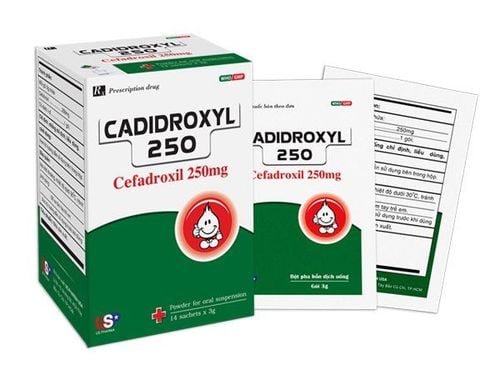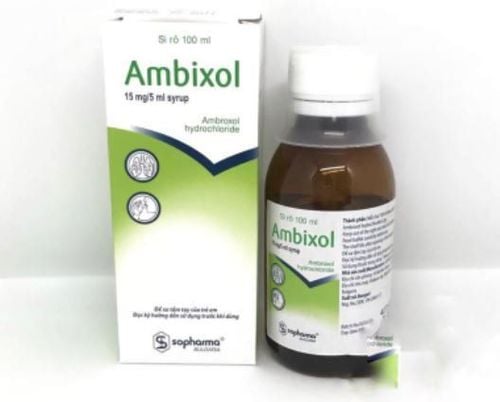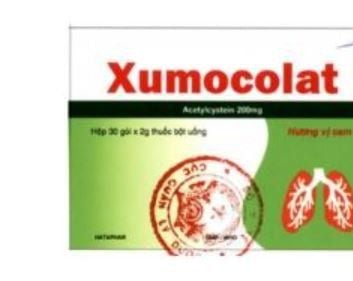This is an automatically translated article.
Fascip 250 is a drug commonly used in cases of respiratory tract infections, skin and soft tissue infections. To better understand this drug, please read along with the detailed information provided in the following article.
1. What is Fascip 250?
Fascip 250 is a drug whose main ingredient is Cefradin, manufactured and registered by Glomed Pharmaceutical Co., Ltd - Vietnam.
Product group: Anti-infective, anti-parasitic, antifungal, antiviral. Ingredients: Cefradine 250mg. Dosage form: In the form of powder mixed with oral suspension. Packing: Each box contains 20 packs x 1.5g. Manufacturing company: Glomed Pharmaceutical Co., Ltd - Vietnam. Registrant: Glomed Pharmaceutical Company Limited - Vietnam. Registration number: VD-30807-18.
2. Uses of Fascip
2.1. Fascip of use Cefradin is a medium-spectrum agent, effective against gram-positive bacteria such as streptococci, staphylococci or pneumococcus (except methicillin-resistant streptococcus). In addition, the drug also works against some gram-negative bacteria such as Proteus mirabilis, Shigella, E.coli and Klebsiella pneumoniae.
Effective on resistant strains such as: methicillin-resistant Staphylococcus, Bacteroid, Pseudomonas aeruginosa, Proteus with positive indole reaction, Enterococcus and Enterobacter.
Fascip drug is prescribed by doctors to use in the following cases:
Patients with upper respiratory tract infections (sinusitis, pharyngitis, bronchitis and otitis media). Patients with lower respiratory tract infections (lobar pneumonia, bronchopneumonia, acute and chronic bronchitis). Patients with skin and soft tissue infections (soft tissue inflammation, boils, impetigo, and abscesses). People with uncomplicated urinary tract infections or severe urinary tract infections (including severe prostatitis). People with otitis media caused by Influenzae. People who need to reduce the risk of infection after surgery have a high risk of infection. 2.2. Contraindications Fascip is contraindicated in people who are hypersensitive to Cephalosporins.
Note: Usually, people who are sensitive or allergic to any of the ingredients in the drug should not take the drug, other cases are specified in the instruction sheet or doctor's prescription. Particularly contraindications of Fascip 250 are understood as absolute contraindications, not for any reason that can be used flexibly.
2.3. Dosage and administration Adults with respiratory tract infections (except lobar pneumonia), skin and skin structure infections, and uncomplicated urinary tract infections: Take 2 times a day, 500mg each time. Adults with severe urinary tract infections (including prostatitis) and lobar pneumonia: 4 times a day, 500mg or 1gx2 times a day. Children over 9 months old: Use 25-50mg/kg/day, divided into 2-4 times. People with otitis media caused by Influenzae: Use 75-100mg/kg/day, divided into 2-4 times, use up to 4g per day. People with renal failure: Need to reduce dose according to ClCr. 2.4. Handling when missed dose, overdose Fascip 250 Overdose:
When using Fascip drug with a dose higher than the prescribed dose, the patient may appear some unusual symptoms. In this case, notify your doctor or medical staff immediately. If an overdose is accompanied by symptoms of an emergency, call 911 immediately for instructions on how to handle and help.
Missed dose:
In case of forgetting to take a dose of Fascip, the patient should take it as soon as he remembers. However, if it is almost time for the next dose, the patient should skip the missed dose and take it as scheduled. Note absolutely do not make up for by doubling the dose of Fascip, because it can be dangerous to health.
3. Notes when using Fascip
3.1. Caution Some subjects need to be cautious when using Fascip, including:
Pregnant women, lactating women, the elderly, children under 15 years old. Patients with liver failure, kidney failure. Patients with hypersensitivity, allergies to any ingredient in the drug, or subjects with hepatic coma, myasthenia gravis and stomach ulcers. 3.2. Drug interaction Fascip 250 when used concurrently with nephrotoxic drugs such as furosemide, aminoside, ethacrynic acid will increase nephrotoxicity. Or when combined with Probenecid slows down the elimination, thus prolonging the effect of Cefradine.
In addition, patients also need to be careful when taking the drug with tobacco, alcohol, alcoholic drinks or fermentation, because they can change the ingredients in the medicine. Please refer to the detailed instructions in the leaflet or consult your doctor or pharmacist.
3.3. Side effects Fascip 250 can cause some common side effects such as: Heartburn, glossitis, nausea, dizziness, abdominal pain, diarrhea, vaginitis, fungal infection, rash, urticaria , joint pain and edema.
In addition, the drug can cause more serious effects such as: Lyell's syndrome, enteritis, elevated liver enzymes, pneumonia, shock, hematological changes, changes in kidney function, PIE syndrome, Vitamin K&B deficiency and hallucinations.
Usually, these side effects go away as soon as the medication is stopped. In the case of rare side effects not listed in the leaflet, the patient should notify the doctor or medical staff for guidance and support.
3.4. Storage It is necessary to carefully read the storage instructions for Fascip 250 listed on the package and the instructions for use of the drug. After use, the medicine should be stored in a cool, dry place, away from direct sunlight, the ideal storage temperature is below 30 degrees Celsius, out of the reach of small children.
Above is important information about Fascip 250. However, patients should consult a medical staff or doctor before using to ensure effectiveness and safety.
Please dial HOTLINE for more information or register for an appointment HERE. Download MyVinmec app to make appointments faster and to manage your bookings easily.













